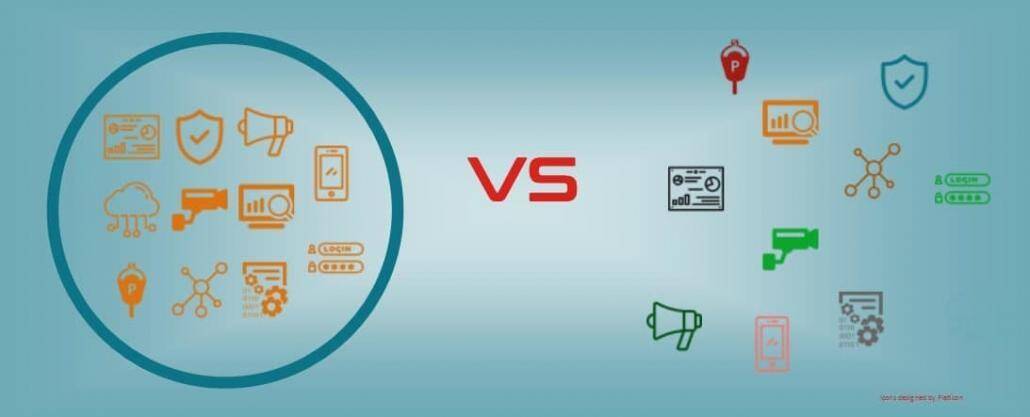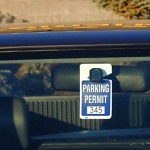Parking security system: the pros & cons of a single-vendor solution

Full disclosure before we get too far into this. OPS-COM offers a single-vendor parking security system for related management so we’re clearly biased when it comes to this topic. We believe the benefits of a single vendor far out way the potential drawbacks. But, we’ll try to be objective in this blog because ultimately, we want you to have the information you need to make good business decisions about how you manage your parking and security operations. We’d love to hear what you think.
________
Parking Security System
Your parking and security system is like any other part of the IT infrastructure that you rely on every day. Some of you may still be managing your processes with spreadsheets you’ve built yourself. However the clear majority of parking and security operations use one or more software applications from one or more vendors.
The parking security system you have in place may have been built in stages. Functionality from different vendors was added as your operational needs changed. For example, you started with a program that manages your clients or users, and then implemented parking online. You may have eventually adopted other features like incident tracking, pay by plate, or mobile parking. This scenario you could have as many as 5 different systems using the same information and data. As a result, managers must tie it all together for proper record keeping.
Other operations may have adopted and implemented the entire system at once. There is no right or wrong way to structure your parking and security system, but there are some advantages and disadvantages with how you approach your vendors and the potential to integrate multiple systems.
To clarify what we mean by a single vendor system, this is when you would source all the software components of your parking and security operations from a single company. That company could be providing you with more than one piece of software or module, but they are all products of the same company.
By contrast, a multi-vendor parking security system would suggest that your system is a mix of software or modules from different companies.
Simplified Vendor Relationships
Advantage: single-vendor
While it might not seem like a relationship with software vendors is that important, it is. (At least we like to think it is with our clients). There are many different points at which you need to work with a vendor and sourcing all of your solutions from one simplifies and expedites the process. With a single vendor you eliminate the need to manage multiple contracts and service level agreements and instead gain a single point of contact for support teams for any technical or trouble shooting issues. You’ll need to manage these with either one or several vendors:
- Pricing and contract negotiations
- Contract renewals
- Service level agreements
- Installation, integration, and trouble shooting
- Technical support resources
Best-In-Class Technology
Advantage: multi-vendor
We’re torn here and this is where it gets tough to remain unbiased because we think our solution is best in its class. However, generally speaking, a vendor who is highly specialized in a single niche area can often put more resources into building a solution and remain highly focused on specific technical improvements. This can come at a cost however as sometimes it means the solution is too narrow and doesn’t fit all possible clients – but not always. The parking and security industry is a niche in itself in many ways so there are many good solutions available from many different vendors.
Internal Resources
Advantage: single-vendor
You’ll most likely reduce the demands of your internal resources by working with a single vendor instead of multiple vendors. The training and demands to learn and become proficient on a single parking security system will be easier. All the modules from a single vendor will have similar functionality, layout, and user experiences so your team will find it easier to apply your specific business logic to become efficient with the system. By contrast, when you use several different products your team will have to grow comfortable with the features and operations of each independently and how they all tie together to get the outcome you are looking for. You’ll also find it less time consuming to have a single point of contact for support and trouble shooting.
Managing Patches, Updates, and Upgrades
Advantage: single-vendor
Updates and patches for any software should always be installed as soon as possible. This ensures the parking security system operates as it should and you aren’t left vulnerable to security threats.
When you have multiple software applications operating together, a change to one can have a ripple effect on how the entire system works. While most vendors understand how their software is used in relation to other software in the industry, it’s still possible that your setup doesn’t respond well to an update or patch to one of the components. The more pieces you have the more likely you will need some trouble-shooting.
It’s also possible that you could receive an update today for one product and spend a day configuring it with the entire system, and then receive an update the next day from a different vendor and must repeat the entire process. With a single vendor, you’re likely to see less frequent, but more comprehensive updates to the system.
It’s also easier to adopt new features or applications from a single vendor. When they introduce a new product or service, it is built to work with the system you have in place. Bringing in a new product to a multi-vendor scenario often means you have to work through several integration processes to be sure the new product or service works, and won’t disrupt what you already have in place.
Technical Support
Advantage: single-vendor
When you work with a single vendor and something goes wrong, you know exactly who to call. The support you receive will likely be more helpful because they understand your entire system and not just their individual piece. Problems that occur in multi-vendor scenarios are sometimes difficult to define and pinpoint the exact cause because of the layers of integration. A lot of time is spent going back and forth between vendors to troubleshoot the issue and identify it’s source. This could also result in higher SLA costs. The support team from one vendor likely won’t help you with problems with a product from another vendor, even if the issues are related.
Flexibility
Advantage: multi-vendor
In many instances, you will have more flexibility on how your system works and what it does with a multi-vendor system. While many vendors who offer a complete system will let you customize your package and define your features, building out your own system can offer more options. The multi-vendor scenario also lets your team look for non-traditional “add-ons” to integrate if you choose too. The caveat however is the more you add into the system, the more complicated it gets, and the more sophisticated your IT team will need to be to manage it. It also opens you up to more compatibility issues. If flexibility is important to you, these obstacles can be overcome.
Integration and Compatibility
Advantage: single-vendor
A single vendor is developing all their components to work together. As a result, there are no snags that can cause delays or extra steps to integrate the systems. This ensures everything is consistent. It also means that you’re likely to get more features and processing speeds can be higher. Multiple-vendor systems can offer potential hiccups between products.
Commitment
Advantage: multi-system
A single-vendor parking security system means you’re tied to a single company. The decisions they make, and the direction they take their development can all affect you. As a result, any large changes at their company can have an impact on their products or support services. This could include; management shifts, take-overs, or technical issues. If their priority for functionality is different than yours, you might be disappointed and find yourself having to either do without or replace your entire system. However, this is where the relationship with that vendor should come in. Your opinion should be important to them and they should keep you up to date on the direction they’re taking.
Cost
Advantage: single-vendor
A parking security system from a single vendor is likely to cost less than creating a system from multiple vendors. Setup, licensing, training, service agreements, and other costs for each system add up when you are working with multiple vendors. First of all, a single vendor system will most often come with a single fee for the entire package. It usually works out to be less than if you were to purchase multiple systems from different vendors. Furthermore, you may have better bargaining power with a single vendor as they have a bigger interest in your business.


